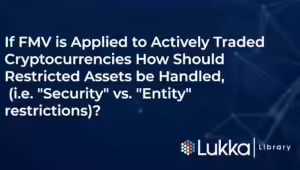Author: Dr. Gerard (Rod) Brennan; Dir. Audit Technologies for Lukka & Adjunct Professor Teaching Advanced Audit and Information Technology in the Rutgers Professional Accounting MBA Program; Rutgers Business School; Newark, New Jersey.
The statements in this document should not be treated as legal, tax, or accounting advice. The document is intended to provide general information only. If a person would like such advice, they should seek professional advice with regard to their specific facts.
The statements in this document reflect guidance issued as of February 6, 2020.
Current Guidance on Accounting for Crypto Assets
As of the date of this writing, there remains very little codified or non-authoritative guidance from US or international accounting regulators/standard setters for the classification and accounting treatment of cryptocurrencies/crypto assets. There remains, however, existing guidance that can be carefully applied to the economic phenomenon of cryptocurrencies to provide relevant non-authoritative guidance for practitioners transacting in cryptocurrencies. One of these areas is valuation and specifically the valuation of restricted assets using fair value accounting (FVA) as described in the FASB’s ASC 820 and in IASB’s IFRS 13. This paper assumes that the practitioner or advisor has already settled on the use of fair value accounting for transactions with actively traded cryptocurrencies – a detailed discussion of FVA for crypto assets in the absence of codified guidance is beyond the scope of this paper, but is addressed in other documents by the author and others. It is important, however, that individuals or entities transacting and reporting in crypto assets make a good faith effort to align as closely as possible with existing standards/guidance for similar assets and explain/disclose elected positions.
Fair value accounting principles under US GAAP (ASC-820) and IFRS (IFRS 13) provide the US and International entities with specific guidance on how to mark to market (i.e. value or price) certain types of assets. US and international accounting guidance is largely converged, defining the guidelines, inputs, and required disclosures for fair value measurements. These specific standards do not establish requirements for when fair value is required or permitted, but only how fair value should be measured once established as an appropriate valuation method. Actively traded crypto assets lend themselves to the application of the above FVA guidance, because there are generally large volumes of observable transactions/prices in principle crypto markets. Like securities and other financial assets addressed more directly by the US and international standards, crypto assets may have similar restrictions on them which impact how FVA should be applied.
The FVA guidance found in ASC 820-10-35 (IFRS 13.11) discusses the impact of restrictions on the sale or transfer of an asset (securities referenced as an example). The guidance makes a distinction in calculating fair value if the restriction is an attribute of the asset (i.e., “Security Restriction”) or if the restriction is an attribute of the holder of the asset (i.e., “Entity Restriction”). Factors that may be used to evaluate whether a restriction is security-specific or entity-specific may include:
- How is the asset transferred to an interested party?
- Are applicable regulations imposed on a holder by standard setters/regulators? • Are there specific contractual terms of acquiring/holding an asset – this could include smart contract conditions on a blockchain?
- Is the asset bound in some way through a purchase contract or other legal commitment?
- Are there specific compliance issues related to the crypto asset?
All of the above situations could apply to cryptocurrencies as they do to securities and other financial assets specifically mentioned in the ASC 820 & IFRS-13 guidance. For example, Initial Coin Offerings (ICOs) for issuing crypto assets are similar in form and nature to Initial Public Offerings (IPOs) used to issue securities. Variations on ICOs in the crypto world such as Initial Exchange Offerings (IEOs) or Security Token Offerings (STOs), while variations on the ICOs, differ primarily only in who they are issued by or offered to in the marketplace. Reviewing the nature of the issuance mechanism for crypto assets helps determine if any stated restrictions are Security or Entity based – this will determine how FVA is applied to the asset.
Examples of Restrictions that may apply to Crypto Assets
There are countless possible restrictions that may apply to crypto assets, but most are similar to those which apply to other assets, and as such, provide an opportunity for alignment with existing guidance/standards. Common restrictions may include:
- Restrictions set by the crypto network/exchange issuing the asset to allow for the secure organized distribution of the coin or token to the marketplace. These types of restrictions would generally be security-based as they apply uniformly to all assets, individuals, or entities securing the assets
- Restrictions on the transfer of securities as a result of existing securities laws applicable to the issuance of any asset deemed a security by the SEC (e.g. Rule 144A, etc.). There is an ongoing debate over the past several years between the issuers of ICOs (IEOs, STOs, etc.) and the SEC as to what types of crypto assets should be treated as securities. Where an issuer or regulator establishes that a crypto asset is a security, any resulting restrictions would generally be Security Restrictions because they would apply to all assets and recipients.
- Restrictions by the issuer on the available purchase quantity for all buyers for some established time. This happens in the crypto world when an ICO or Exchange places limits on the amount of a coin or asset a buyer can secure with each transaction or over some specified period of time. This may be a result of security or scaling issues by the exchange or the blockchain limiting the participation pace and volume. Restrictions resulting from purchase limitations which apply uniformly to all buyers and all assets would also generally be Security Restrictions.
- Restrictions resulting from “lockouts” or “blackouts” are not very common with crypto and as with other assets they generally apply only to specific groups of buyers or potential buyers who may be registered or unregistered insiders to the ICO/Offering and could “front run” or otherwise game the offering to their advantage. This is a real concern in the crypto world with the lack of regulation and enforcement addressing the actions of issuers/insiders, providing too many opportunities to act nefariously on insider information. These restrictions may also be temporary, only applying during the ICO. Generally, “lock out” or “blackout” restrictions for crypto impacting a limited group of buyers would be Entity Restrictions because they do not impact all owners of a crypto asset.
- Restrictions resulting from lending arrangements/contracts where crypto assets held by an investor are pledged as collateral are becoming more prevalent. Cryptocurrency/ asset lending is a rapidly growing segment of this emerging technology and crypto assets are often tendered as secured collateral. Restrictions on securities resulting from the securities being pledged as collateral would generally represent an Entity-Specific restriction.
- Restrictions related to airdropped tokens or hard forks where access is hindered because the exchange is not ready or able to support a new token for some time. These types of restrictions generally apply uniformly to all buyers of an asset for some period of time and would be considered Security Restrictions.
FVA Treatment of Restrictions
Applying the ASC-820 and IFRS 13 standards to restricted asset valuations of crypto assets, the following treatment would apply. For restrictions identified as “Entity Restrictions” no adjustment should be made to the FVA price determined following the above guidance for actively traded (Level 1) assets as described in the standard. This guidance assumes the entity has access to the market in question even if a specific entity restriction prevents the entity from accessing the assets at a point in time.
For restrictions determined to be “Security Restrictions,” applying to all assets/participants, the guidance requires fair value be adjusted/discounted depending on the nature and duration of the restriction. The adjustment should reflect appropriate qualitative and quantitative risk factors specific to the security. These may include the duration of the restriction and potential impact on the volatility, liquidity, etc., on the asset in the marketplace. The FVA adjustment should be appropriately documented and disclosed.
Conclusion
While no specific guidance existing for FVA of restricted crypto assets, the existing FASB & IASB guidance can be carefully applied to cryptocurrencies/assets to calculate and adjust as appropriate for restrictions on the respective fair values.



